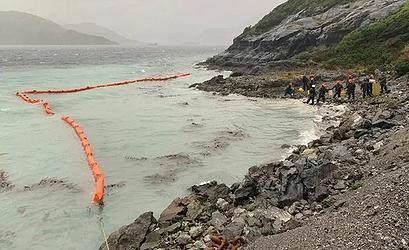
SANTIAGO, Chile, July 29, 2019 (ENS) – An oil spill under investigation by the Chilean Navy on the far southern coast of Patagonia has been contained, mining company CAP SA said on Sunday.
The diesel oil spill of 40,000-liters (10,500 gallons) occurred Saturday at CAP’s onshore terminal on Guarello Island, on the Chilean side of Patagonia, the pristine southernmost region of both Chile and neighboring Argentina.

The spill happened about 150 miles (240 km) north of the town of Puerto Natales, and moved into the waters of the South Pacific, the navy said.
CAP, which mines limestone on the island for use in steel production, reported the incident to the navy. The company said in a statement that it initiated its protocol for the incident, which included control and mitigation measures.
“As an additional measure, a process of permanent monitoring of the area has been coordinated through a specialized foundation,” the company said.
On Sunday, the Chilean navy confirmed the spill and said its anti-contamination team was on the scene. The military sent out a barge and an ocean patrol boat to the waters near the island of Guarello.
Greenpeace Chile described the spill as “a serious environmental crisis that can have devastating consequences for the waters of Chilean Patagonia.”
Matías Asun, national director of Greenpeace in Chile, said, “It is an extremely serious situation thinking about the pristine waters in which this environmental emergency has occurred. It is necessary to think that the area is extremely difficult to access and that it is an area of great wealth of marine mammals, such as whales and dolphins, which could be seriously affected in their habitat since when they came to the surface to breathe they could be found with this layer of oil.”
Greenpeace explained that the first impact of an oil spill is that it generates a film on the water that prevents the entry of light, which directly affects marine ecosystems.
Severe contamination also occurs as oil contaminants are highly toxic. And, in the long term, it damages the reproductive and feeding system of marine species.
“The ability to quickly contain these spills is key to trying to safeguard as much as possible the affected habitat,” said Asun. “The government must provide all the logistics and human capacity necessary to stop this emergency. By the way, the CAP company must also deliver as much information as possible and not hide background, as unfortunately happens to those responsible in many of these cases of fuel spills.”
What caused the spill is still unclear, and CAP has promised to collaborate in the investigation into the cause of the spill.
Copyright Environment News Service (ENS) 2019. All rights reserved.
